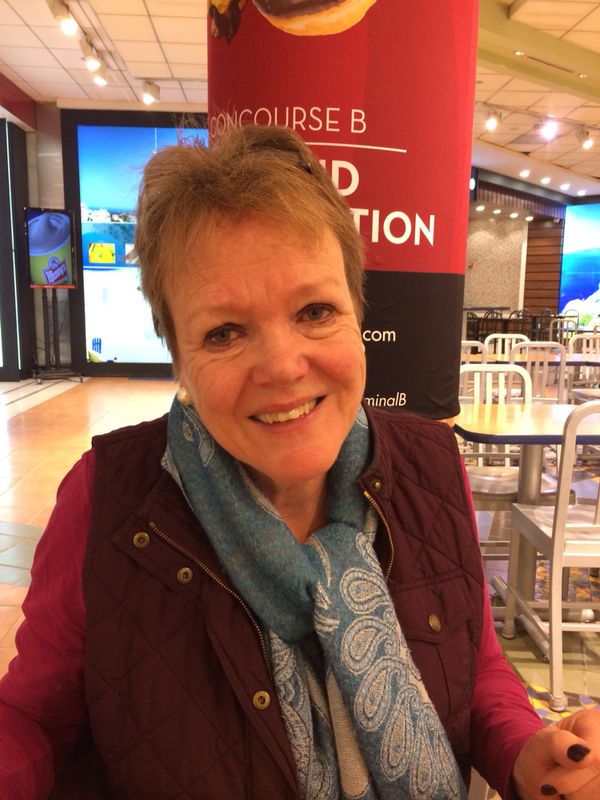Feelings are like waves, says Karin Brouwer. You cannot stop them from 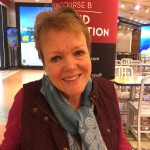 coming, but you can decide which ones to surf. Karin spoke at the March breakfast, served by the United Methodist Men, on Finding Inner Resilience to Meet Life’s Challenges.
coming, but you can decide which ones to surf. Karin spoke at the March breakfast, served by the United Methodist Men, on Finding Inner Resilience to Meet Life’s Challenges. 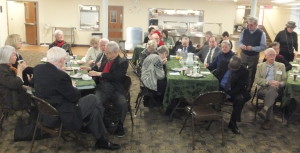 Karin trained as a trauma, abuse, and grief recovery counselor, and her insights were so valuable that everyone asked for the power point notes. Here they are.
Karin trained as a trauma, abuse, and grief recovery counselor, and her insights were so valuable that everyone asked for the power point notes. Here they are.
Adult education — drop-ins welcome
“Why I am an atheist who believes in God” is the book now being studied by the Contemporary Issues class, which meets in the library at 9:30 a.m. on Sunday mornings. The author, Frank Schaeffer, is the son of noted conservative evangelists who founded L’Abri, a chain of worldwide retreat centers. All are welcome, and new participants or drop-ins are encouraged. Click here for listings of other adult education opportunities — including the new study that starts this Tuesday evening.
Teach Us to Want: Tuesday Bible Study
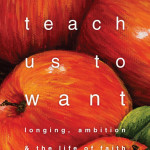
As Christians, we are squeamish about desire. Isn’t wanting selfish? Aren’t we supposed to find and follow God’s will rather than insisting on our own?
Please join us for a new and exciting five week study, “Teach Us to Want: Longing, Ambition: the Life of Faith.” Author Jen Pollock Michel explores the themes of Fear and Courage, Grace, Scripture and Prayer, Petition and Confessions, Community and Commitment. Come and engage in conversation on how to identify and overcome the tension that sometimes exists between personal ambition, desire, and faith.
“When desire is informed by Scripture and reformed by our spiritual practices,” writes Michel, “it can root us more deeply in the fundamental belief that God is good and generous…”
Classes will be on Tuesdays at 7 p.m., weekly, from February 3 to March 3. The book is available in paperback or by download at Amazon or from the publisher, Intervarsity Press. Contact: Shivonne McKay at shivonne.mckay@ptsem.edu.
What We Believe: We seek to know God personally
In this essay Jeff Ransom has written the first in a seven-part series illustrating the vision statements of Princeton United Methodist Church as described here:
“We aim to know God personally as Father, Son, and Holy Spirit. We glorify God in our words and deeds and celebrate God’s love. We are open to all of God’s possibilities. As God loves us, so we love one another.”
The New Year: talking with my (new?) self
Wow! Whew! ‘Twas a great Christmas season: The celebration of the Christ child, family visits, food, carols, concerts, pageants, kids’ excitement, charity to all, even football playoffs and cleaning up. I enjoyed good times, good fellowship, good deeds, good services, and (good gracious me) – my new year resolutions.
Speaking of my resolutions: Am I good with God, after all that I’ve been doing for family, friends, and others in the church? I think I’ve been loving God and neighbor this season, but what about that other part – loving myself? Doesn’t Luke 10:27 (“You shall love the Lord your God with all your heart, and with all your soul, and with all your strength, and with all your mind; and your neighbor as yourself.”) say my relationship with God, and with others, should be as meaningful as my relationship with myself? If so, this passage is not just about me not being selfish, but about me being more loving to me as a model for me loving my neighbor and God. That love means I’m to try to be a better Christian disciple. God already loves me so much: John 3:16 (“For God so loved the world that He gave His only Son, so that everyone who believes in Him may not perish but have eternal life”).
Then how can I be more loving of myself so I can grow as a disciple?
Well, let me take stock of my “disciple checklist”: I listen to the sermons, give my time and money, serve on a committee or two, do community service, love and support others and my family. Am I missing anything in my “loving me by what I do” duties?
By now you have probably figured out that I’m talking about improving my spiritual growth, and becoming a mature Christian. To grow, I need to challenge myself. If I look at Jesus’ command in Matthew 5:48 (“Be perfect as your heavenly Father is perfect”), I realize there is no comfort in Christ from coasting, or resting at, where I already am.
The bottom line: I need to deal with two things: my sin, and my service – fighting the former, and growing the latter. Both are addressed by Jesus through the gospels, and by Paul, in his letters. According to Jesus and Paul (and for Methodists, John Wesley), I can’t make any progress by my own efforts. While the right next step is to seek the only capable helper, the Holy Spirit, my human-ness (reluctant to yield control) resists my inviting that help. Alone, I seem to restrict my own access to the Holy Spirit.
Because I can’t seem to manage this individually, I really need a love-binding community — a church community — of those in a similar condition. In such a community we can help each other to connect with the Holy Spirit and overcome our personal obstacles. Yet fear of exposing my “private issues” to others keeps me isolated, unable to move forward on my spiritual journey.
Is Princeton UMC not a trusted community where it is “safe” for me to take that next step? Well, No . . and Yes!
The NO answer: At the Sunday corporate worship service, or in the typical functional committee meeting, the church may offer a heart-warming or head-inspiring growth for the prepared disciple, but it just doesn’t seem to be the right “bare-your-soul space for spiritual changes” toward Christian maturity. The result: conversions of nominal or non-Christian persons do not often happen here. Don’t agree? Ask yourself, except for youth confirmations, how many professions of faith happen at PUMC ?
The YES answer: PUMC is exactly the right spot for me if I am in a small group that uses daily intercessory prayer and discretionary support of confessions for its members. I would have the accountability, caring and learning environment I need to commit myself to be a new creation, someone with an intimate relationship with God. If we invite others to join the groups, and seek to encourage new leaders, small groups could also provide a vital engine for church growth.
My conclusion: I should either start such a small group, or work toward revitalizing an existing small group.
If you conclude this is a personal message of resolution for its author, you are correct. Now go through it again with “you as the me.” Make it your own story to see if any of it resonates with your own discipleship path. See if you agree that, together in a small group, we could each be better disciples.
The Small Group Ministry at PUMC will look at existing small groups. More than 40 meet the minimal definition (hint: they’re groups which are . . small). Our principle was stated by Jesus in Matthew 18:20, “For where two or three are gathered in my name, I am there among them.” Many of us — including our annual conference leaders– believe our church and personal growth depends upon vital small groups.
Early this year PUMC will set up small group facilitator training and coaching support to help existing small groups aim to be more vital. We will also establish new vital small groups, either study- and/or mission-oriented, which follow the small group health guidelines for praying, caring, reaching out, and empowering. Let me know if you you’re interested. Let’s grow together!
Jeff Ransom, Lay Leader
Trenton as a Mission Field
All United Methodist Women are invited to Turning Point United Methodist Church in Trenton next Sat., Aug 16th from 12-3 p.m. for an open house and BBQ for “friends” of the church. UMW and PUMC have been supporting Turning Point’s many efforts in reaching out to their community. We are invited to come and see the work that is being done there.
“We have a great story to tell,” say the organizers.”Come hear about what we are doing, and how others can join in to transform Trenton.”
There will be a Video Presentation of Point Ministries, a Tour of Church Facilities, and the chance to Meet and Greet Ministry leaders and Participants.
Contact Anne F through the church office for directions or carpooling information.
Also needed: a basic sewing machine for a family in need. If anyone has an older machine, contact Anne through office@princetonumc.org
Adult Study: “Moral Tribes”
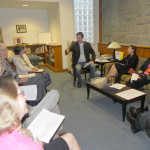 Contemporary Issues adult class is reading “Moral Tribes: Emotion, Reason, and the Gap Between Us and Them,” by Joshua Greene. It meets every Sunday in the PUMC library at 9:30 a.m. on Sunday mornings — with the possible exception of April 27 when there will be only one worship service at 9:30. “We welcome new attendees at any time,” says Charles.
Contemporary Issues adult class is reading “Moral Tribes: Emotion, Reason, and the Gap Between Us and Them,” by Joshua Greene. It meets every Sunday in the PUMC library at 9:30 a.m. on Sunday mornings — with the possible exception of April 27 when there will be only one worship service at 9:30. “We welcome new attendees at any time,” says Charles.
According to reviewer Vanessa Bush, “Greene’s strategies for examining moral reasoning are as applicable to day-to-day decisions as they are to public policy. This is a highly accessible look at the complexities of morality.”
The Heart of Faith class has moved to the Fellowship Hall at the same time, 9:30, and various studies during the week welcome newcomers.
Fellowship Hall: Celebrate on May 3
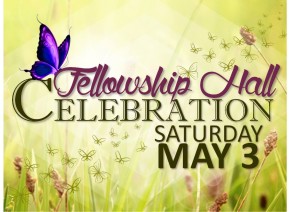
Our ground floor space has turned from a homely caterpillar into a beautiful butterfly, thanks to our Opening Doors capital campaign. Everyone is invited to help celebrate the transformation of the Fellowship Hall!
On Saturday, May 3, at 6 p.m., enjoy a delicious sit down dinner with entertainment provided by our own Scott Langdon and music by the PUMC Ensemble. Hear about how we used to be known as the ‘Rowdy Methodists,’ learn about we changed during our 165 years — and help launch our future work for Christ in the new space.
Tickets will be available in the Sanford Davis room after each service. Suggested donation: adults $10.00 per person, $5.00 for children. Get yours soon — tickets will not be sold at the door.
Robotics Revolution? George Young
 Where is R2-D2 when we need him? We won’t see a robot like that for a good long while, says George Young. He will speak on “The Robot Revolution: The Promises and Limitations of Collective Robots” at a breakfast sponsored by United Methodist Men on Sunday, October 6, at 8 a.m., in the Sanford Davis Room. Everyone — men and women — is invited. A $5 donation is requested. Email umm@princetonumc.org or call 609-924-2613
Where is R2-D2 when we need him? We won’t see a robot like that for a good long while, says George Young. He will speak on “The Robot Revolution: The Promises and Limitations of Collective Robots” at a breakfast sponsored by United Methodist Men on Sunday, October 6, at 8 a.m., in the Sanford Davis Room. Everyone — men and women — is invited. A $5 donation is requested. Email umm@princetonumc.org or call 609-924-2613
Industrial robots have reshaped manufacturing, domestic robots help maintain floors and lawns, and military robots and drones have been developed to help fight wars. “Despite these advances, ” says Young, “state-of-the-art robots remain far removed from the automated personal assistants, companions or enemies that science fiction writers have dreamed of for decades.”
A native of South Australia, Young has undergraduate degrees from the University of Adelaide. He is completing his PhD in mechanical and aerospace engineering at Princeton University, where his research focuses on understanding how the structure of interactions between individuals within a group (of robots, birds or people) affects the behavior of the entire group. In particular, he examines how groups manage uncertainty and how sharing information can lead to better or worse performance.
“Rather than attempting to build ever more complicated and sophisticated machines, today many researchers are attempting to expand our technological capabilities using an entirely different idea — building simple machines that can work together to achieve difficult tasks. These jobs could include monitoring the environment, growing crops, responding to natural disasters, building infrastructure and a host of other tasks.”
Before coming to Princeton he obtained undergraduate degrees in mechatronic engineering and pure mathematics from the University of Adelaide in his home state of South Australia. He and Elizabeth — who spoke to the UMM last spring — will shortly be moving to Memphis, Tennessee. We will miss them!
UMW: Fairy Garden Fun
ask the plants of the earth, and they will teach you… Job 12: 8a
Last weekend, Judy M and Linda H helped United Methodist Women make delightful “fairy gardens” using tiny plants, props, and imagination. Here are the entrancing results.










Bloom Where You Are Planted
Reposted from Princeton Comment.
After seven moves and three kids, accomplished early in our marriage, we landed here in Princeton and have stayed planted for more than 30 years. (We love it here, but the cost of NOT moving is more clutter! It’s hard to get rid of stuff when you stay put.)Cheryl Mart and Karin Brouwer have more recent experience with the joys and challenges of moving. They are leading a non-denominational Christian study, based on a Susan Miller book and video, at Princeton United Methodist Church on Wednesdays, starting September 19, 10:30 to noon.
This free one-semester study is designed to help in the process of letting go, starting over, and moving ahead with your life after a move. Women do not need to attend the church to attend the free classes, which involve videos, reading, and discussion.
“Over the last 25 years I’ve lived with my husband and three children in five different countries,” says Brouwer. “With every move I have experienced God’s sustained love to overcome difficulties and the importance of having a church family. It helped me to bloom where I am planted.”
Mart, a registered nurse, had a difficult transition in moving from Texas to Princeton and leaving her married children behind. “I found encouragement in ‘After the Boxes are Unpacked’ by Susan Miller,” she says. “By offering this study, we hope to reach out to those who are struggling with similar issues.”
Perhaps the “Moving On after Moving In” study is “right” for the newcomer you know. Or maybe another resource is. The Women in Business subset of the Princeton chamber comes to mind. In any case, the very best resource is probably YOU. Make time. Reach out. Have coffee.
For more information click here or email movingon@princetonumc.org, or call 609-921-0730. (Disclosure — I’m a member at PUMC).

